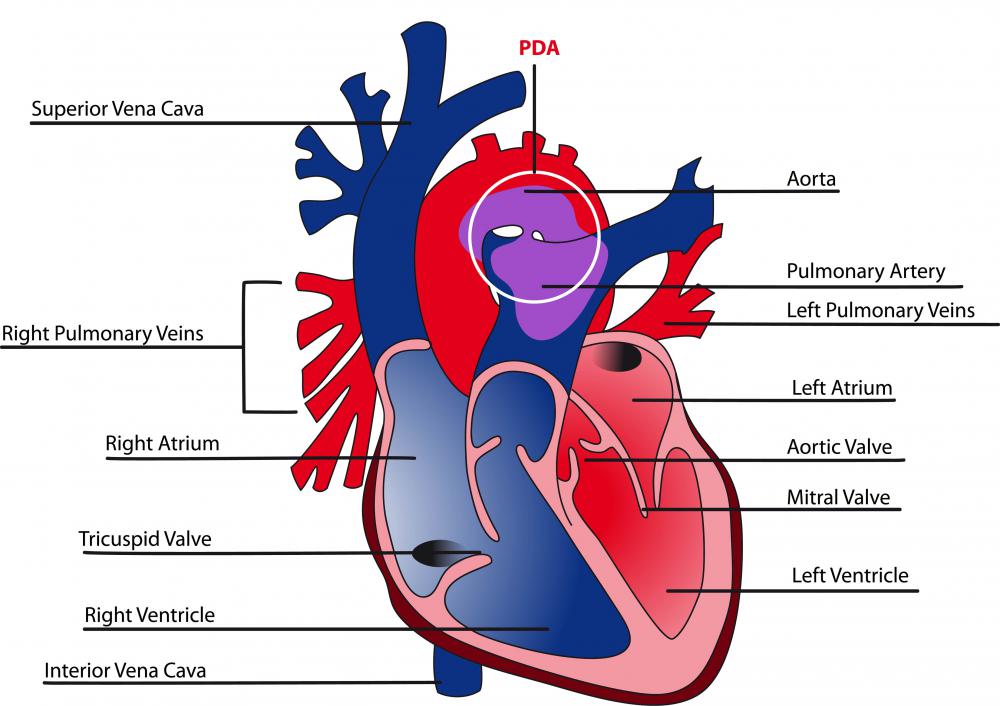At WiseGEEK, we're committed to delivering accurate, trustworthy information. Our expert-authored content is rigorously fact-checked and sourced from credible authorities. Discover how we uphold the highest standards in providing you with reliable knowledge.
What is a Diastolic Heart Murmur?
An unusual sound made by the heart is called a heart murmur. Heart murmurs may be diastolic, systolic, or continuous, depending on when they occur. A diastolic heart murmur is a noise made while the heart is filling up with blood. Systolic heart murmurs occur when the heart is pumping blood out. If a heart murmur is heard throughout the whole heartbeat, it is classified as continuous.
There are two basic types of heart murmur, regardless of whether it is a diastolic heart murmur or another classification. An innocent heart murmur does not indicate any problems with the heart. In other words, it is usually a harmless medical condition. If it is classified as abnormal, the patient may have other heart problems, such as a problem with the heart’s valves.

Patients with an innocent heart murmur will not typically experience any symptoms of the condition. An abnormal heart murmur may cause blue skin, particularly on the fingers and lips, shortness of breath, and weight gain. This condition may also cause chest pain, dizziness, and fainting, as well as excessive sweating. It is also possible for those with this condition to not experience any symptoms.

An innocent diastolic heart murmur, or other types, may be caused by any activity or condition that causes more rapid blood flow. This could include physical exercise, pregnancy, or a fever. It may also be caused by anemia, or lack of adequate red blood cells, and by hyperthyroidism, which is excessive amounts of thyroid hormones.
Heart murmurs that are abnormal and occur in children may be caused by a congenital birth defect. Possible defects include abnormalities in the heart valves or holes in the heart. An adult with an abnormal heart murmur may have suffered from endocarditis, which is an infection of the lining of the heart. It can also be caused by rheumatic fever or by valve calcification, which means that the heart valves become hardened.

A diastolic heart murmur may be diagnosed during a routine physical exam. Doctors can detect unusual noises with a stethoscope. Sometimes, this condition may be diagnosed at birth. If a diastolic heart murmur, or other type, is suspected, the patient may be referred to a specialist, such as a cardiologist.
Heart murmurs that are innocent do not typically require special treatment. Treating an underlying medical condition, such as hyperthyroidism, can resolve the condition. Abnormal heart murmurs may require monitoring and medication, such as drugs to lower blood pressure. A patient may sometimes need surgery to rebuild a blood vessel or to fix or replace a heart valve.
AS FEATURED ON:
AS FEATURED ON:














Discussion Comments
@honeybees-- Having a baby with a heart murmur would be hard because, as you said, they can't communicate with you.
One of my sons was diagnosed with a diastolic heart murmur when he was a teenager. This is classified as a heart murmur that is not abnormal. I find it hard to understand how any kind of heart murmur would not be abnormal.
He doesn't have any problems, but he is an athlete, and as a mom, this always worries me.
My nephew has an aortic heart murmur. This is something that he was born with, and when he gets older will have to have some kind of surgery.
This was found shortly after he was born. Every once in awhile his lips will turn blue, and it can get pretty tense for everybody. He is too young to explain how he feels, so it can be hard for his parents to always know what to do.
I have a friend who has lived with heart murmurs her whole life. She was born with a hole in her heart, and has gone through several heart surgeries.
Each surgery has been scary for her, and she looks at life differently than most people. She is really hoping the last heart surgery she had is her last one. The doctors have been able to do a lot for her, but she will probably continue to have some kind of heart murmur for the rest of her life.
My husband is in his 50's and at his last physical exam they discovered he has a heart murmur. He was just going in for an annual exam, and the doctor noticed this when he was checking his heart.
He doesn't have any idea how long he has had this heart murmur, but he has not had any symptoms or problems related to this. They would not renew his DOT physical until he had this checked out by a cardiologist though.
He went to the cardiologist and passed all the tests without any problems. Since this was considered an innocent heart murmur, this is just something they will watch and listen for from here on out, and no other treatment was recommended.
Post your comments